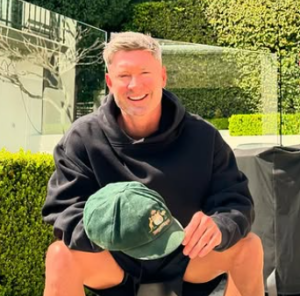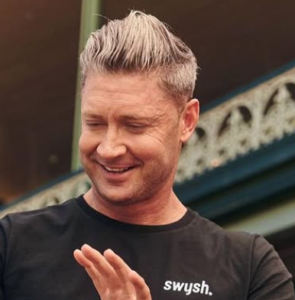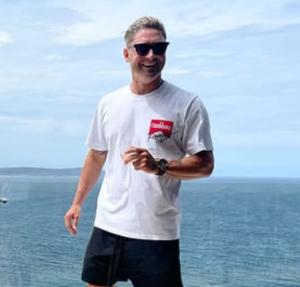The possibility of Usman Khawaja retiring during the fifth Test of the BGT 2024-25 at the SCG adds a layer of poignancy to the series
While fans and pundits may speculate, the ultimate decision rests with Khawaja. Whether he continues to don the Baggy Green or chooses to bow out, his legacy as one of Australia’s finest cricketers is secure.
Khawaja’s career serves as a testament to resilience, adaptability, and excellence. If he indeed decides to make the SCG his farewell stage, it will undoubtedly be a momentous occasion—one that cricket enthusiasts worldwide will cherish.
Michael Clarke’s cricketing journey is a blend of exceptional talent, unwavering determination, and remarkable achievements.
From his early days in Liverpool to his captaincy heroics on the world stage, Clarke’s legacy as a cricketing icon is firmly etched in history.
His contributions continue to inspire the next generation, ensuring his impact on the sport endures for years to come.

Also Read: Mukesh Kumar (Cricketer) Bio, Age, Career, Family, Net Worth, And More
Table of Contents
Michael Clarke’s Perspective on Retirement Timing
Michael Clarke’s comments bring a strategic lens to Khawaja’s potential retirement.1
Clarke believes that retiring at the Sydney Cricket Ground (SCG), Khawaja’s home ground, would offer a fitting and honorable conclusion to his illustrious career.
“This is Uzzie’s home Test match, the SCG. He has been an amazing player, absolutely amazing,” Clarke said on the Beyond 23 Cricket Podcast.
According to Clarke, this moment would allow Khawaja to exit the stage on his own terms, surrounded by family, friends, and supportive fans.
@Beyond23pod @tabcomau @georgieparker 🏏🎙️ pic.twitter.com/nwSAaKV9AE
— Michael Clarke (@MClarke23) November 28, 2024
The Road Ahead: Preparing for the 2025-26 Ashes
Retirement at this juncture could also serve a pragmatic purpose for Australian cricket. Clarke emphasized that it would provide the team ample time to groom a new opening batter for the 2025-26 Ashes series at home.
The Ashes is one of cricket’s most storied rivalries, and preparation is key. Bringing in a younger player now would allow them to gain valuable experience before stepping into the high-pressure Ashes arena.
Khawaja’s former opening partner, David Warner, opted for a similar retirement plan. Warner bid farewell during the Sydney Test against Pakistan in the 2023-24 season.
This approach allowed him to conclude his career on a personal and emotional high, with his family present at his home ground. Clarke’s suggestion for Khawaja mirrors this sentiment, advocating for a dignified exit rather than a phase-out.

Michael Clarke: Earning the Right to Decide
Clarke’s remarks also underline the respect Khawaja commands within the cricketing fraternity.2
“Uzzie’s earned the right to do his own thing,” he said, emphasizing that the decision should be entirely Khawaja’s.
After years of dedication and contribution to Australian cricket, it’s only fitting that he chooses the terms of his departure.
The Sydney Cricket Ground holds a special place in Australian cricket. For Khawaja, it’s not just a home venue but a stage where he has delivered memorable performances.
Retiring at the SCG would be a symbolic gesture, celebrating his journey and legacy in front of an adoring crowd.
Impact on the Australian Team Dynamics
Khawaja’s retirement would undoubtedly leave a void in the Australian lineup. His experience and calm demeanor have been assets for the team. However, his departure could also open doors for emerging talent.
Players like Nathan McSweeney and Sam Konstas, who have shown potential, might benefit from the opportunity to step up and solidify their places in the team.
Every cricket team goes through cycles of transition. For Australia, this could be a pivotal moment. The retirement of senior players like Khawaja would signal a new chapter, allowing the team to rebuild and strategize for the future. This phase, though challenging, is essential for long-term success.

Michael Clarke: Who Is He?
Early Beginnings in Liverpool, New South Wales
Michael John Clarke, affectionately known as “Pup,” was born on April 2, 1981, in Liverpool, New South Wales.3
Raised in a working-class family, Clarke’s early years were marked by a relentless passion for cricket. His father’s indoor cricket center provided the perfect environment for young Clarke to nurture his batting skills.
Despite being left-handed in everyday tasks, Clarke adopted a right-handed stance for batting, a decision that would define his cricketing style.
Clarke attended Marsden Road Public School and joined the Western Suburbs District Cricket Club during his formative years. By the age of 17, Clarke faced a significant challenge—scans revealed degenerative discs in his lower back.
Yet, he persevered, incorporating core strengthening exercises to manage the condition. His resilience and determination became hallmarks of his illustrious career.
First-Class Debut and Early Success
In December 1999, Clarke made his first-class debut for New South Wales against the touring Indian side at the Sydney Cricket Ground.
A year later, he received a scholarship from the AIS Australian Cricket Academy, further propelling his career.
Clarke’s time in England in 2002, playing for Ramsbottom Cricket Club, marked a significant milestone. He became the first player to score a double century in the Lancashire League, showcasing his prodigious talent and earning recognition on an international stage.

Also Read: MLC 2024 Challenger: Corey Anderson’s (Cricketer) Unbelievable Catch Stuns Fans
Michael Clarke: Career
Rising Through the Ranks: International Debut
Clarke’s hard work paid off when he debuted for the Australian One Day International (ODI) team in 2003 against England.
A year later, he made his Test debut in Bangalore against India, scoring a sensational 151 runs. This innings not only marked the arrival of a future star but also cemented his place in a formidable Australian lineup.
Clarke’s leadership journey began in 2007 when he was appointed captain of Australia’s Twenty20 International (T20I) team. By 2011, he had assumed the role of captain for both the Test and ODI teams, succeeding Ricky Ponting. His tenure as captain was defined by a mix of strategic brilliance and personal grit.
Under his leadership, Australia achieved several memorable victories, including the 2013-14 Ashes whitewash against England and the 2015 Cricket World Cup triumph.
The 2015 Cricket World Cup: A Career Highlight
The pinnacle of Clarke’s captaincy was undoubtedly the 2015 Cricket World Cup. Leading a rejuvenated Australian side, Clarke’s astute strategies and inspiring leadership culminated in a resounding victory against New Zealand in the final.
His personal contribution of 74 runs in his last ODI innings was a fitting farewell to a remarkable limited-overs career.
Clarke was known for his stylish batting, characterized by elegance and precision. A right-handed middle-order batsman, he excelled in both Tests and ODIs.
Clarke’s ability to adapt to different conditions and formats made him a vital asset to the Australian team. His occasional left-arm orthodox spin bowling and sharp slip-catching added further dimensions to his skill set.

Michael Clarke: Post-Retirement Ventures
After retiring, Clarke transitioned into various roles, including commentary, coaching, and philanthropy.
His insights as a cricket analyst and his involvement in promoting youth cricket reflect his enduring passion for the sport.
Clarke’s autobiography and public appearances further showcased his journey, inspiring aspiring cricketers worldwide.
Some of Clarke’s most memorable innings include his 329* against India in 2012 at the Sydney Cricket Ground.
This knock remains one of the highest scores by an Australian captain in Test cricket. Clarke’s penchant for scoring double centuries and his remarkable consistency across formats earned him a place among the cricketing elite.
Clarke retired from all forms of cricket following the 2015 Ashes series. His departure marked the end of an era, leaving behind a legacy of 28 Test centuries and over 8,000 runs in both Tests and ODIs. Clarke’s leadership during challenging times and his contributions to Australia’s cricketing dominance earned him widespread respect.
Michael Clarke: Interview
Michael Clarke makes a BIG retirement call and regarding his decision he gave interview, which he posted on his official account.
View this post on Instagram
Honours and Recognition
- Michael Clarke’s contributions to cricket were recognized with numerous awards, including the Allan Border Medal, awarded four times (2005, 2009, 2012, 2013).
- In 2015, he was appointed an Officer of the Order of Australia (AO) for his services to cricket and philanthropy.
- Clarke’s journey from a young boy practicing in his father’s indoor cricket center to leading Australia to World Cup glory is a testament to his dedication and resilience.
- His story serves as an inspiration to athletes worldwide, demonstrating that challenges can be overcome with perseverance and passion.
- Clarke’s career was not without its challenges. His degenerative back condition often posed significant hurdles, requiring meticulous management and frequent breaks.
- Off the field, Clarke faced criticism during periods of poor form and controversies surrounding his leadership style.
- Yet, his ability to overcome adversity and deliver under pressure solidified his legacy as one of Australia’s finest cricketers.
Also Read: Shan Masood (Pakistan Cricketer): Who Is He? Bio, Wiki, Age, Career, Wife and More




